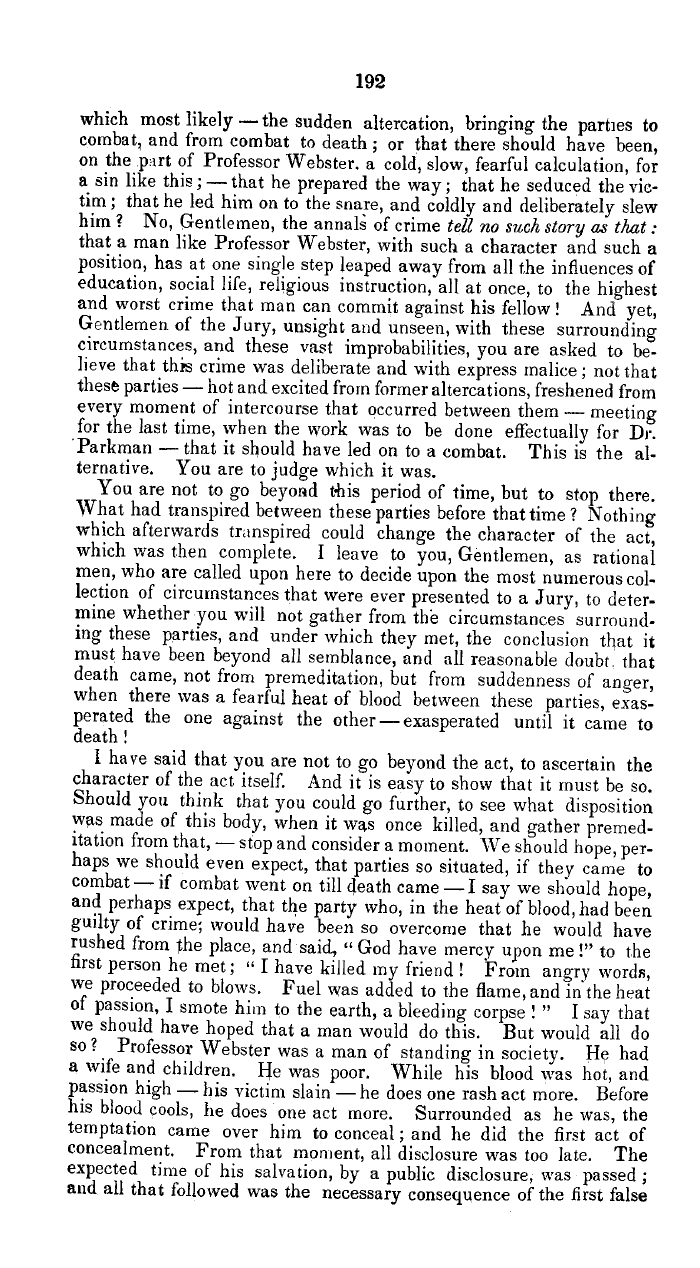|
192
which most likely-the sudden altercation, bringing the parties to
combat, and from combat to death ; or that there should have been,
on the part of Professor Webster. a cold, slow, fearful calculation, for
a sin like this;-that he prepared the way; that he seduced the vic-
tim; that he led him on to the snare, and coldly and deliberately slew
him ? No, Gentlemen, the annals of crime tell no such story as that:
that a man like Professor Webster, with such a character and such a
position, has at one single step leaped away from all the influences of
education, social life, religious instruction, all at once, to the highest
and worst crime that man can commit against his fellow! And yet,
Gentlemen. of the Jury, unsight and unseen, with these surrounding
circumstances, and these vast improbabilities, you are asked to be-
lieve that this crime was deliberate and with express malice; not that
these parties - hot and excited from former altercations, freshened from
every moment of intercourse that occurred between them - meeting
for the last time, when the work was to be done effectually for Dr.
'Parkman - that it should have led on to a combat. This is the al-
ternative. You are to judge which it was.
You are not to go beyond this period of time, but to stop there.
What had transpired between these parties before that time? Nothing
which afterwards transpired could change the character of the act,
which was then complete. I leave to you, Gentlemen, as rational
men, who are called upon here to decide upon the most numerous col-
lection of circumstances that were ever presented to a Jury, to deter-
mine whether you will not gather from the circumstances surround-
ing these parties, and under which they met, the conclusion that it
must have been beyond all semblance, and all reasonable doubt, that
death came, not from premeditation, but from suddenness of anger,
when there was a fearful heat of blood between these parties, exas-
perated the one against the other-exasperated until it came to
death !
I have said that you are not to go beyond the act, to ascertain the
character of the act itself. And it is easy to show that it must be so.
Should you think that you could go further, to see what disposition
was made of this body, when it was once killed, and gather premed-
itation from that, - stop and consider a moment. We should hope, per-
haps we should even expect, that parties so situated, if they came to
combat-if combat went on till death came-I say we should hope,
and perhaps expect, that the party who, in the heat of blood, had been
guilty of crime; would have been so overcome that he would have
rushed from the place, and said, °° God have mercy upon me !" to the
first person he met; '° I have killed my friend ! From angry words,
we proceeded to blows. Fuel was added to the flame, and in the heat
of passion, I smote him to the earth, a bleeding corpse ! " I say that
we should have hoped that a man would do this. But would all do
so? Professor Webster was a man of standing in society. He had
a wife and children. Ije was poor. While his blood was hot, and
passion high - his victim slain -he does one rash act more. Before
his blood cools, he does one act more. Surrounded as he was, the
temptation came over him to conceal ; and he did the first act of
concealment. From that moment, all disclosure was too late. The
expected time of his salvation, by a public disclosure, was passed ;
and all that followed was the necessary consequence of the first false
|

